Saffron

Kashmiri Mongra saffron, often referred to as the “king of saffrons,” is a premium and highly coveted spice that originates from the picturesque region of Pampore in Kashmir, India. Known for its rich history, unique qualities, and unmatched purity, this saffron has earned a reputation as the best in the world.
The tradition of saffron cultivation in Kashmir dates back over a thousand years, with the fertile lands of Pampore being the heart of this saffron-producing region. The delicate flowers of the Crocus sativus plant, from which saffron is derived, are carefully hand-harvested in the autumn months. The saffron threads are painstakingly separated and dried with precision, ensuring that only the finest quality is produced.
What truly sets Kashmiri Mongra saffron apart from other varieties is its exceptional quality and the meticulous cultivation process. Unlike the saffron grown in other parts of the world, Mongra saffron is known for its deep red, long, and thick stigmas, which are rich in aroma, color, and flavor. This saffron boasts a high concentration of safranal (the compound responsible for its distinct aroma), crocin (responsible for its vibrant golden color), and picrocrocin (which contributes to its unique taste). These elements combine to create a saffron with an intense and long-lasting fragrance, a brilliant color that transforms dishes, and a delicate, subtle taste that enhances any recipe it graces.
The purity of Kashmiri Mongra saffron is also unparalleled. The rigorous hand-harvesting process ensures that only the best quality threads are selected, and it is free from additives, fillers, or artificial coloring. This ensures that every strand is a symbol of the region’s commitment to excellence. The saffron’s high value and purity make it sought after by chefs, connoisseurs, and health enthusiasts worldwide.
Additionally, the growing conditions in Kashmir contribute to the uniqueness of Mongra saffron. The region’s cool climate, coupled with the rich, fertile soil, offers the perfect environment for the saffron crocus to flourish. The high altitudes of Pampore, combined with traditional farming practices passed down through generations, contribute to the saffron’s superior quality, giving it a distinct character that is hard to replicate elsewhere.
The superiority of Kashmiri Mongra saffron isn’t just limited to its physical properties—it is also deeply embedded in the cultural and spiritual fabric of the region. Saffron has been an integral part of Kashmiri life for centuries, woven into the fabric of local cuisine, medicine, and rituals. The reverence with which the people of Pampore grow and harvest the saffron makes it not just a spice but a piece of Kashmir’s heritage.
In conclusion, Kashmiri Mongra saffron from Pampore is more than just a spice—it is a testament to centuries of tradition, craftsmanship, and purity. Its rich history, exceptional quality, and superior attributes make it a product unlike any other, earning it the title of the best saffron in the world. Whether used in cooking, skincare, or traditional medicine, it continues to be a cherished and luxurious commodity, captivating the senses and elevating everything it touches.
Saffron Receipes
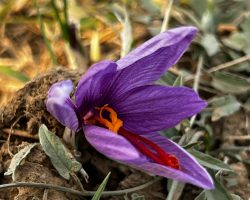
Saffron Rice
- Soak a pinch of saffron threads in 2 tbsp of warm milk for 10 minutes.
- Rinse 1 cup basmati rice until water runs clear.
- Heat 1 tbsp ghee in a pan. Add the soaked saffron (with milk), and sauté for a minute.
- Add rice, 2 cups water, a pinch of salt, and cook until the rice is tender
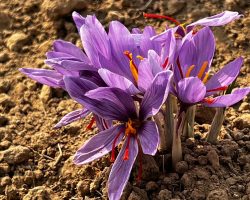
Saffron Tea
- Boil 2 cups of water.
- Add 2-3 saffron threads and steep for 5-10 minutes.
- Sweeten with honey or sugar, and enjoy!
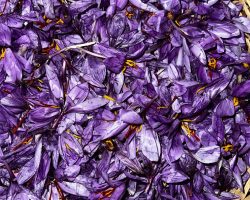
Saffron Milk
- Soak a few saffron threads in 2 tbsp warm milk for 10 minutes.
- Heat the milk with saffron until warm (not boiling).
- Add a pinch of cardamom and sweeten with sugar or honey.
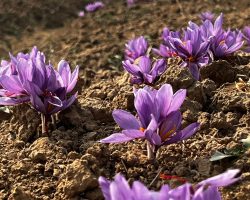
Saffron Chicken
- Marinate chicken with yogurt, 1 tsp saffron soaked in warm water, garlic, and spices for 30 minutes.
- Sauté onions and cook marinated chicken until done.
- Garnish with coriander and serve with rice or naan.
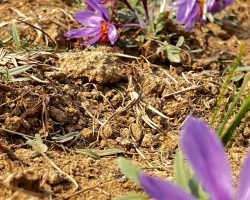
Saffron Custard
- Soak a pinch of saffron in 2 tbsp warm milk.
- Heat 1 cup milk and mix in sugar, cornstarch, and the soaked saffron.
- Stir until thickened, then chill and serve cold.
Saffron Health Benefits
- Rich in Antioxidants
Saffron contains powerful antioxidants, including:
- Crocin
- Crocetin
- Safranal
- Kaempferol
These compounds help protect your cells from oxidative stress and free radical damage.
- Mood Enhancement and Antidepressant Effects
Saffron has been dubbed the “sunshine spice” partly for its potential to help with mild to moderate depression. Some studies suggest it may be as effective as certain antidepressant medications (like fluoxetine) without as many side effects.
- Mood Enhancement and Antidepressant Effects
- Improved Memory and Learning
Crocin and crocetin may help improve cognitive function and memory. Early research shows promise for saffron as a supportive therapy in Alzheimer’s disease.
- Improved Memory and Learning
- PMS Relief
Saffron may help reduce symptoms of premenstrual syndrome (PMS) such as mood swings, irritability, and pain, possibly by influencing serotonin levels.
- PMS Relief
- Appetite Control and Weight Management
Some evidence suggests saffron may reduce snacking and suppress appetite, possibly due to its mood-enhancing properties reducing emotional eating.
- Appetite Control and Weight Management
- Heart Health
Saffron’s antioxidant and anti-inflammatory properties may contribute to lower blood pressure and improved cholesterol profiles, supporting cardiovascular health.
- Heart Health
- Anti-Cancer Potential
In lab studies, crocin has shown the ability to inhibit cancer cell growth. However, more human research is needed to confirm this effect.
- Anti-Cancer Potential
- Eye Health
Saffron may help improve vision in people with age-related macular degeneration (AMD), possibly by increasing blood flow to the eyes and protecting retinal cells.
- Eye Health
- Anti-Inflammatory and Pain-Relieving Effects
Saffron has traditional uses in managing inflammation and chronic pain. Some research supports its use in conditions like arthritis.
- Anti-Inflammatory and Pain-Relieving Effects
- Caution
• High doses (over 5g/day) can be toxic.
• Pregnant women should avoid large amounts, as it may stimulate uterine contractions.
• Always check for high-quality, pure saffron to avoid adulteration.
